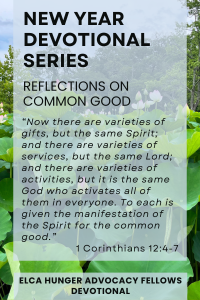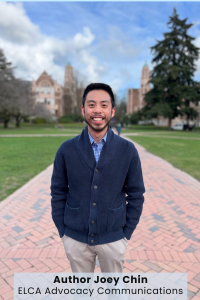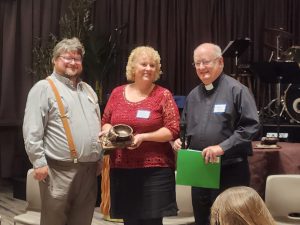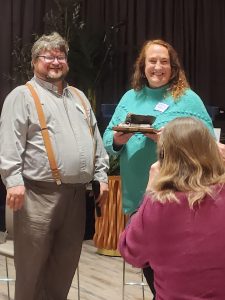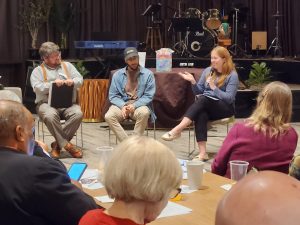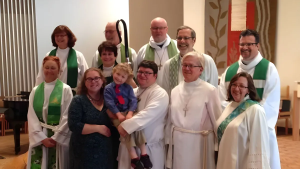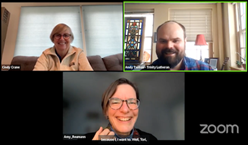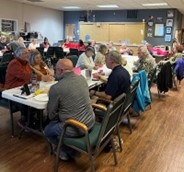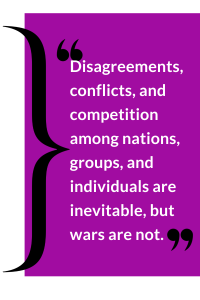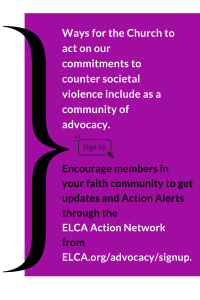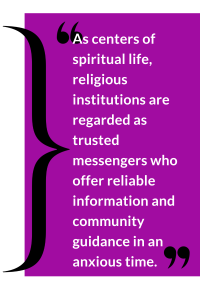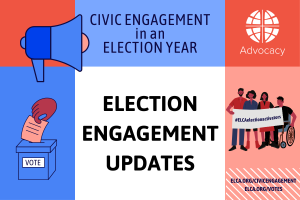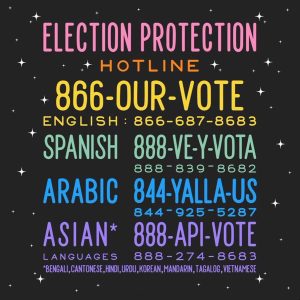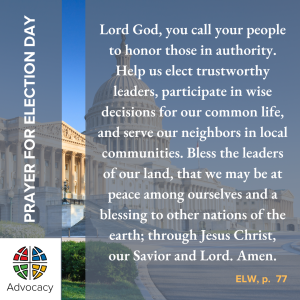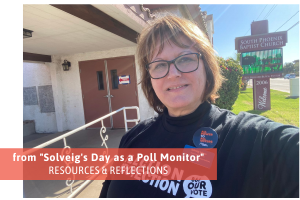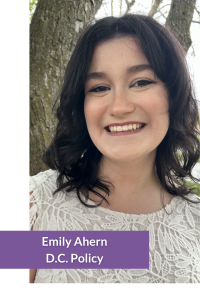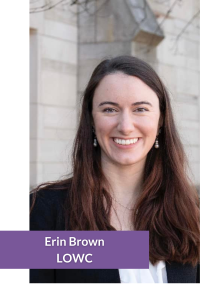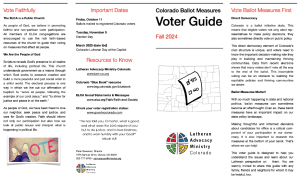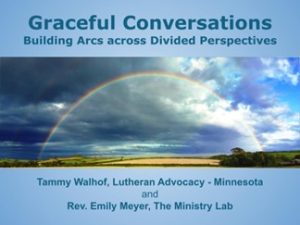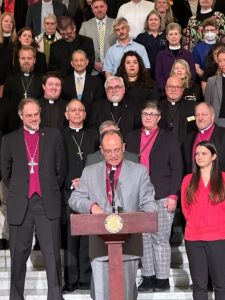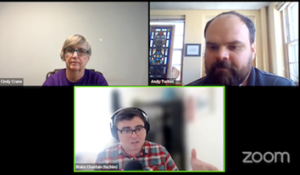Following are updates shared from submissions of the Lutheran Office for World Community and state public policy offices (sppos) in the ELCA Advocacy Network this month. Full list and map of sppos available.
UN | ARIZONA | COLORADO |MINNESOTA | OHIO | PENNSYLVANIA | TEXAS | VIRGINIA | WISCONSIN
Lutheran Office for World Community, United Nations, New York, N.Y. – ELCA.org/lowc
Christine Mangale, Director
Summit of the Future/Pact for the Future: Lutheran Office for World Community (LOWC) was a strong presence at the Summit of the Future, which occurred in September, where a Pact for the Future was produced. The Pact for the Future outlines a roadmap for global collaboration in six key areas: Global Governance and Multilateralism Reform, Climate Action and Sustainability, Digital Governance and Innovation, Peace and Security, Equity and Social Justice, Financing for Development. LOWC hosted from the Lutheran World Federation (LWF) the General Secretary Rev. Dr. Anne Burghardt, Head of Advocacy Isaiah Toroitich, and Head of Communications Arni Danielsson, as well as from the ELCA the Executive for the Service and Justice Home Area Rev. Khader El-Yateem, Senior Director of Witness in Society Rev. Amy Reumann and a representative from the ELCA office of the Presiding Bishop Kristen Opalinski.
LOWC, LWF and other ELCA staff were well-represented at several events, including “Interfaith Youth Responses to the Century’s Biggest Challenges: Faith Based Contributions to the Summit of the Future” (Lutheran Delegate Speaker: Rev Amy Reumann), “Migration for the Future” ( Lutheran Delegate Speaker: Rev. Khader El-Yateem), ”Toward Transformative Peace: A Multi-Stakeholder Dialogue on Transformative Peace” (Lutheran Delegate Speakers: Rev. Dr. Anne Burghardt & Rev. Khader El-Yateem), as well as Jazz Vespers and more.
The ELCA has invested heavily in both programs and advocacy that work towards common aims that we share with the Pact. Faith based organizations, including the LWF and ELCA, have a critical role to play in this work, not the least of which is to inspire hope for a more dignified and right’s-based future. The Pact of the Future is a politically binding (non-legally binding) agreement. This means that it will take civil society, including LWF and ELCA, to hold states accountable to their commitments.
Lutheran Advocacy Ministry Arizona – lamaz.org
Solveig Muus, Director
Voter Engagement: As part of our congregational engagement work around voting, we’re promoting voter registration and tracking, election monitoring, early voting, and plenty of prayer. Lutheran Advocacy Ministry Arizona (LAMA) developed a Voter Guide to help faithful voters as they consider Arizona’s 13 ballot propositions.
In addition, LAMA produced a series of video clips featuring people of faith expressing their feelings about the upcoming election. Filmed at the ELCA Youth Gathering in New Orleans, these 90-second clips can be an excellent resource for congregations. For easy sharing in your own social media channels, you can find them on LAMA’s Facebook page or YouTube.
Video #1: Does your faith influence your political opinion?
• Taina Diaz-Reyes, Savannah Jorgensen, Dcn. Becca and Addison Graf.
Video #2: Is voting important to you?
• Rep. Lindsay James (D-Iowa), Pastor Khader El-Yateem, Rev. Ismael Calderón and Whitney Apel.
Video #3: How can people with differing opinions work together during election season?
• Silas Kulkarni, Giovana Oaxaca and Frances J. Dobbs.
Video #4: What is your advice for someone who is on the fence about voting?
• Rev. Evie Landrau, Rev. Amy Reumann and Cathy Jacobs.
Video #5: Why should Lutherans vote?
• Will Milner, Zaya Gilmer and Bishop Elizabeth Eaton
Video #6: Do you think you would vote differently if you weren’t a person of faith?
• Caroline Graff, Ethan Roberts and Autumn Byars.
Video #7: What are your hopes post-election?
• Kayla Zopfi, Maya Goehner, Alexandra Murcia and Samantha Boyer.
Lutheran Advocacy Ministry Colorado – lam-co.org
Peter Severson, Director
LAM-CO VOTER GUIDE RELEASED: Lutheran Advocacy Ministry Colorado (LAM-CO) has released our 2024 Voter Guide. This year, Coloradans have fourteen ballot measures to consider on their statewide ballot. That’s not even including any local measures! It’s a lot to take in, but our Voter Guide is here to help. We’ve distilled all the measures into an easy at-a-glance table, with brief analysis and summaries of everything you’ll see.
We also have taken positions on four of these ballot measures:
• NO on Prop 128, Parole Eligibility: This measure extends the length of time people must be incarcerated before being eligible for parole while removing incentives like earned time for good behavior. It’s overly punitive, expensive, and offers no net public safety benefit.
• YES on Prop JJ, Retain Sports Betting Revenue: Colorado should be able to keep the revenue it’s collected from sports betting to support water infrastructure and projects. If this measure fails, “excess” tax revenue will be refunded to casinos.
• YES on Amendment I, Bail Exemption: For public safety and with care and consideration for victim families, we should restore the bail exemption for persons arrested on suspicion of first-degree murder with evident proof and/or a greater degree of presumption.
• YES on Amendment J, Remove Ban on Same-Sex Marriage: Same-sex marriage became legal de facto in Colorado in 2014, and this would remove old constitutional language. The ELCA’s social statement Human Sexuality uplifts marriage as the highest context for trust and mutuality in human relationships, and nearly 15,000 married same-sex couples now reside in Colorado.
Lutheran Advocacy – Minnesota – lutheranadvocacymn.org
Tammy K. Walhof, Director

Jacob Summerville, Lutheran Advocacy Minnesota Hunger Advocacy Fellow
Hunger Advocacy Fellow: Lutheran Advocacy-MN (LA-MN) welcomed Jake Summerville in September. He is already a very valuable part of the LA-MN team, creating election materials (see below) and providing leadership in recruitment of Poll Workers. Jake comes to LA-MN with several years’ experience in youth ministry, a seminary degree (plans to be ordained as Deacon), and a background in communications.
Election Materials & Recruitment: LA-MN created election resources in the form of fliers/posters, postcards, and stickers for synods and congregations to use (available here). LA-MN also sent poll worker recruitment information to 169 churches in Greater Minnesota, and many more in the two Metro Area synods.
Graceful Conversations: A 1.5 hour workshop Tammy developed almost 10 years ago has been turned into a 5 session workshop series with videos, worksheets, and facilitator guide with the help of Rev. Emily Meyer (Director, Ministry Lab). Instead of teaching how to be and act, it now helps develop skills to make Graceful Conversation and Action part of our core being. This series doesn’t negate the value of other trainings (Braver Angels) but uses a faith lens and is meant to have a shelf life far beyond our current contentious election cycle. (Available here).
Out & About: In addition to finishing Graceful Conversations and welcoming Jake, Tammy attended a screening of the Plastic People documentary, participated in a Synod Theological Event (short presentation & display), and played a key role in a synod/region event celebrating the 50th Anniversary of ELCA World Hunger (Poverty Simulation, 2 workshops, & display).
Hunger Network in Ohio – hungernetohio.com
Deacon Nick Bates, Director
To End Hunger in Ohio, We Must End Gerrymandering:
The Hunger Network continues to talk with community groups and congregations on the importance of a YES VOTE on State Issue 1. State issue 1 will create a 15 member citizens commission – 5 democrats, 5 republicans, and 5 independents – to oversee the drawing of legislative maps. Sadly, our current process is marred and bi-partisan courts have declared our current maps are unconstitutional multiple times. The new process will create a way to avoid conflict of interest that hurts our democracy. When elected officials are accountable to the public, we can guide them towards prioritizing their communities and not special interests.
UPCOMING EVENTS
Annual Celebration: Nov. 10 3:30 All Saints Lutheran Church
Advocacy in Advent: Dec. 10 at the Ohio Statehouse
Lutheran Advocacy Ministry – Pennsylvania – lutheranadvocacypa.org
Tracey DePasquale, Director
Lutheran Advocacy Ministry in Pennsylvania (LAMPa) continued equipping disciples for peacebuilding and faithful civic engagement in September-October. Working with Common Ground – USA, LAMPa offered webinars on digital peacebuilding, active listening , difficult conversations and managing conflict. Find recordings and links to resources. LAMPa activated our election support network to share accurate information, respond to needs of elections officials, and prepare to defend vulnerable communities or address attempts to undermine elections. Nearly 350 people received daily devotions through LAMPa’s 40-day Reflections Before an Election.

Launch of the Southeastern Pennsylvania Synod’s (SEPA) Love Revolution initiative
LAMPa Director Tracey DePasquale joined Southeastern Pennsylvania (SEPA) Synod in the launch of their Love Revolution initiative. We look forward to accompanying congregations as they live into God’s call to love our neighbors.
The Rev. Erin Jones, LAMPa Communications and Advocacy Engagement Manager, attended the annual In God’s Image gathering in Southeastern Pennsylvania Synod, helping to lead an advocacy workshop there and sharing LAMPa’s legislative efforts to advance equality and oppose discrimination and hate.
LAMPa was thrilled to announce recipients of the Isaiah 58:12 fellowship, supported by the inaugural Jackie Maddox Racial Justice Grant, as they began a year of transformative learning in their communities.
In the final weeks of the legislative session, LAMPa advocates pressed their senators to protect health care in Pennsylvania by strengthening reviews of proposed hospital and health system mergers.
DePasquale joined the task force working on the new social statement on civic life and faith in Chicago as they reviewed feedback on the draft statement.
Texas Impact – texasimpact.org
Scott Atnip, Director of Public Witness
The Texas Impact Board of Directors recently released their biennial legislative agenda, entitled “Free, Safe, and Flourishing: A Faithful Agenda for Texas.”
Texas Impact is coordinating a Houston Faith Votes cohort to engage in civic engagement work to demonstrate the impact congregations can have in engaging voters. The fifteen congregations are joining with many other congregations using Texas Faith Votes resources.
Congregations are participating in the Vidas Robadas (Stolen Lives) displays, displaying the names of victims of gun violence on t-shirts.
An increasing number of congregations are signing up to participate in Texas Impact’s Courts and Ports program, traveling to the Texas-Mexico Border to experience public policy issues being lived out on the border.
Finally, the Weekly Witness podcast continues, and we were fortunate to have Robert Rivera, Vice President of the Synod Council of the Gulf Coast Synod, join the program to discuss immigration issues.
Virginia Interfaith Center for Public Policy – virginiainterfaithcenter.org
Kim Bobo, Co-Executive Director
October has been an especially busy month for the Virginia Interfaith Center for Public Policy. The organization finished the last of five regional celebrations that honored legislators, volunteers, and congregations. It hosted three Faith and Housing workshops around the state helping congregations learn how they might use their buildings or land for affordable housing. The organization also held its first Interfaith Souls to the Polls event encouraging congregations to caravan to Sunday polling locations for early voting. Registration opened for the organization’s annual lobby day, which will be Jan. 15, 2025 in Richmond. Register here: https://virginiainterfaithcenter.org/day-for-all-people-2025/
Lutheran Office for Public Policy – Wisconsin – loppw.org
Rev. Cindy Crane, Director
Wednesday Noon Live: We had two interviews on the first Wednesday of October rather than our usual single interview for Wednesday Noon Live, because of the significance of the upcoming election.
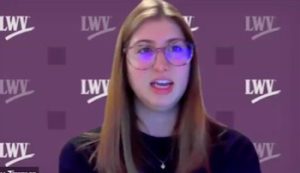
We need poll workers! Hear from Delaney Zimmer, Voter Services Coordinator at the League of Women Voters of Wisconsin.

Watch for misinformation (intentional and unintentional), know where to check out the facts about the voting process. In addition, learn about important details about absentee ballots. Hear from Riley Vetterkind, Public Information Officer at the Wisconsin Elections Commission.
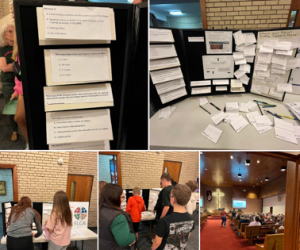
Congratulations to the La Crosse Area Synod on their ComFest for confirmation students! There were meaningful speakers and a lot of activities. Many took the advocacy quiz and posted their advocacy interests at the Lutheran Office for Public Policy – Wisconsin (LOPPW) table.
Additional Activities Engaging with the Church: Between mid-September and mid-October, LOPPW’s director also led three workshops on Dietrich Bonhoeffer and his context, one workshop on human trafficking, one workshop on advocacy, and one on the draft social statement on Civic Life and Faith. We also broadly advertised the showing of the film, “Bad Faith” about Christian Nationalism, which was attended by several ELCA members beyond and around the state.
LOPPW hosted the Raise the Age Coalition (returning 17-year-old youth to the juvenile justice system) annual strategy planning meeting in October. We will regroup after the elections as well as meet with the entire coalition soon.
 I am a Jewish progressive young adult who immigrated to the United States from the Holy Land as a child. Since my teenage years, I have felt a particular draw to political activism as a path for goodness to prevail. I also knew from that point that I wanted to build my career around that path. Since then, I have been fortunate to be able to lend my talents to a variety of causes.
I am a Jewish progressive young adult who immigrated to the United States from the Holy Land as a child. Since my teenage years, I have felt a particular draw to political activism as a path for goodness to prevail. I also knew from that point that I wanted to build my career around that path. Since then, I have been fortunate to be able to lend my talents to a variety of causes.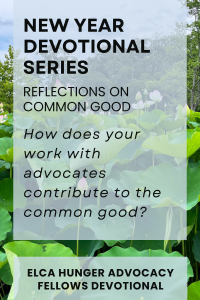
 ONE OF VALUE
ONE OF VALUE






